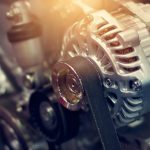Engine Recycling 101
At Logel’s Auto Parts, we are passionate about auto recycling and helping our customers save money on their vehicle.
We’ve developed an in-depth process for recycling car engines from vehicles damaged in a collision — we examine them for damages and then recycle them in an environmentally responsible manner.
A used engine offers huge cost savings of potentially thousands of dollars, depending on your vehicle. Here are some important details about our engine recycling process and how it benefits both you and the environment.
Draining the Fluids
The first step in engine recycling is to drain the fluids from the engine block. Car engines contain a number of different fluids like motor oil, antifreeze, and fuel. These fluids contain various hazardous compounds, which can harmful to the environment and must be disposed of correctly.
When recycling an engine, it’s important to make sure that these pollutants are safely removed by trained professionals. When we recycle damaged engines at Logel’s, we will always drain the fluids before recycling the engine.
Removing Smaller Components
The next stage in the engine recycling process is to remove smaller components from the engine. Small engine components, such as alternators, compressors, and ignition system parts, will generally be made of valuable materials and should be removed before the rest of the engine is recycled.
At Logel’s, we will typically remove all these small components and ship them to other facilities for recycling or remanufacturing. Depending on their condition, these parts may be recycled for raw materials (typically aluminium or cast iron) or end up as refurbished parts or sold and reused on another vehicle.
Our Recycling Process
Over the years, we have been able to create the infrastructure at Logel’s to make this in-depth recycling process possible — setting us apart from many other competitors in the industry. It’s a decision that has been fuelled by our passion for driving improvement in auto industry recycling.
The goal of our recycling process is to break down the engine into as many component parts as possible. Unlike other auto wreckers, who will simply crush and strip old vehicles, we focus on pulling out everything that we can after a collision.
We know from experience that the more you break the vehicle down, the more can it be effectively recycled. This creates a longer process for our team, but it is more environmentally-friendly and yields better profitability in the long run.
Save Money on a Recycled Engine
Buying a recycled engine for your vehicle offers huge cost savings for consumers when compared with purchasing a new engine. Our estimates have shown us that it is possible to save thousands of dollars on a recycled engine, depending on your make and model. Don’t believe it? Get a quote and make the comparison for yourself.
All of our used engines are checked for leaks and damages, and other parts are examined for wear. Each engine comes with options for standard or extended warranties from one to five years. If you are not completely satisfied with your recycled engine, you can return it with your receipt for a no-hassle, 100% refund during the first 60 days.







